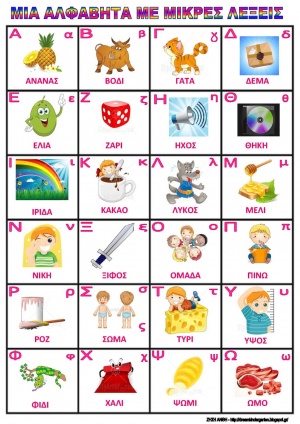Difference between revisions of "Language/Modern-greek-1453/Pronunciation/Alphabet"
| Line 1: | Line 1: | ||
[[File:ΜΙΑ ΑΛΦΑΒΗΤΑ ΜΕ ΜΙΚΡΕΣ ΛΕΞΕΙΣ_Σελίδα_3.jpg|thumb]] | [[File:ΜΙΑ ΑΛΦΑΒΗΤΑ ΜΕ ΜΙΚΡΕΣ ΛΕΞΕΙΣ_Σελίδα_3.jpg|thumb]] | ||
== The Greek Alphabet == | == The Greek Alphabet == | ||
The Greek alphabet consists of | The Greek alphabet consists of 24 letters and has been used since 900 BC to write the Greek language. It is considered to be the first writing system to use a separate symbol for each vowel and consonant, and it is the oldest alphabetic system still in use. Today, Greek letters are used not only for writing modern Greek but also for mathematical and scientific symbols. | ||
One of the most notable contributions of the Greek alphabet is its influence on the development of other writing systems. The Gothic, Glagolitic, Cyrillic, Coptic, and Latin alphabets all owe their existence to the Greek alphabet. Originally, the Greek alphabet had only one form for each letter. | |||
The distinction between uppercase and lowercase letters in the Greek alphabet developed during the modern era, following a similar trend as the Latin alphabet. This feature was not used in ancient Greek writing, but it is now used in both ancient and modern Greek writing. | |||
It is uncertain what names were given to the letters, and some letters had | The Greek alphabet is based on inscriptions found in Crete, dating back to around 800 BC. It is uncertain what names were given to the letters, and some letters had multiple forms. During this time, Greek was written mainly from right to left in horizontal lines. | ||
The uppercase and lowercase forms of the 24 letters are: | |||
{| class="wikitable" | {| class="wikitable" | ||
! | ! | ||
Revision as of 16:22, 11 March 2023
The Greek Alphabet
The Greek alphabet consists of 24 letters and has been used since 900 BC to write the Greek language. It is considered to be the first writing system to use a separate symbol for each vowel and consonant, and it is the oldest alphabetic system still in use. Today, Greek letters are used not only for writing modern Greek but also for mathematical and scientific symbols.
One of the most notable contributions of the Greek alphabet is its influence on the development of other writing systems. The Gothic, Glagolitic, Cyrillic, Coptic, and Latin alphabets all owe their existence to the Greek alphabet. Originally, the Greek alphabet had only one form for each letter.
The distinction between uppercase and lowercase letters in the Greek alphabet developed during the modern era, following a similar trend as the Latin alphabet. This feature was not used in ancient Greek writing, but it is now used in both ancient and modern Greek writing.
The Greek alphabet is based on inscriptions found in Crete, dating back to around 800 BC. It is uncertain what names were given to the letters, and some letters had multiple forms. During this time, Greek was written mainly from right to left in horizontal lines.
The uppercase and lowercase forms of the 24 letters are:
|
Denomination Ονομασία |
Prononciation Προφορά. |
Equivalent to the International Phonetic Alphabet |
|---|---|---|
|
Α α |
alpha : voyelle |
a, as in cat |
|
Β β |
vita |
v, as in vase |
|
Γ γ |
gamma |
between y as in yes and g as in go, but with no hard 'g' sound, e.g. weather |
|
Δ δ |
delta |
th, as in the |
|
Ε ε |
épsilon : voyelle |
e, as in very |
|
Ζ ζ |
zêta |
z, as in zoo |
|
Η η |
îta =voyelle | ee, as in bee |
|
Θ θ |
thîta |
th, as in think |
|
Ι ι |
iota : voyelle |
ee, as in beer or i, as in sit |
|
Κ κ |
kappa |
k, as in look |
|
Λ λ |
lamda |
l, as in love |
|
Μ μ |
mi |
m, as in money |
|
Ν ν |
ni |
n, as in night |
|
Ξ ξ |
ksi |
x, as in box |
|
Ο ο |
ômicron : voyelle |
o, as in box |
|
Π π |
pi |
p, as in path |
|
Ρ ρ |
ro |
r, as in road |
|
Σ σ / ς : Τελικό |
sigma |
s, as in sit |
|
Τ τ |
taf |
t, as in table |
|
Υ υ |
Ypsilon : voyelle |
ee, as in bee |
|
Φ φ |
fi |
ph, as in photo |
|
Χ χ |
chi |
h, as in house |
|
Ψ ψ |
psi |
ps, as in upstairs |
|
Ω ω |
oméga : voyelle |
Video
Author
- Ευγενική χορηγία που στοχεύει να βοηθήσει μαθητές ή μη, απανταχού της Γης, που επιδίδονται στην εκμάθηση της ελληνικής γλώσσας!
- Contribution bénévole visant à aider les personnes, partout dans le monde, qui sont engagées dans l'apprentissage de la langue grecque !
- Voluntary contribution aimed at helping people, all over the world, who are committed to learning the Greek language!
